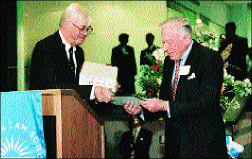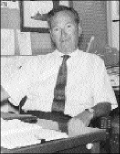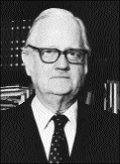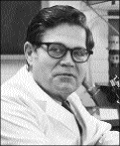|
Obituaries 1925 Clifton Fadiman, writer, editor and broadcast personality, Sanibel Island, Fla., on June 20, 1999. See story . 1926 Jerome L. Greene, attorney and philanthropist, New York, on May 27, 1999. A 1928 graduate of the Law School, Greene was a founding member of the Manhattan law firm of Marshall, Bratter, Greene, Allison & Tucker and an important patron of the Law School as well as many other New York institutions. A trustee of Montefiore Medical Center since 1972, he led the medical center in founding the Mosholu Preservation Corporation, a nonprofit community development support corporation -- the first and only NYC business improvement district sponsored under the auspices of an academic institution. He helped endow Montefiore's Jerome L. and Dawn Greene Medical Arts Pavilion, a nine-story, state-of-the-art ambulatory care facility that opened in 1997. More recently, Greene and his wife were benefactors of The Children's Hospital at Montefiore, scheduled to open in 2001. Honored in 1991 at the annual "Celebrate Montefiore" dinner, he was nominated by Montefiore for the United Hospital Fund's 1999 Distinguished Community Service Award. Greene's other philanthropic activity included service as a trustee at WNET/Channel 13, New York's public television station, and the Juilliard School; chairman of the board of the Hirshorn Museum of the Smithsonian Institution in Washington, D.C.; and support of the UJA-Federation of New York. A longtime member of Lincoln Center's board
Jerome Greene '26 (right) accepts a
citation from New York Sen. Daniel Patrick Moynihan at a Law School
function. PHOTO: JON ROEMER of directors and emeriti council, Greene underwrote the Center's annual "Mostly Mozart" Festival (celebrating his favorite composer) and supported programs at the Vivian Beaumont Theater. In addition, Greene was one of the most loyal supporters of Columbia's Law School. His recent gift of more than $5 million enabled the Law School to complete renovations to its main building on Amsterdam Avenue that is named for him. Greene was the recipient of the Judge Learned G. Hand Human Relations award and a doctor of laws degree from Columbia. He also received the Oscar S. Straus Award for Philanthropy on Behalf of New York City. Greene and his wife, Dawn, who survives him, were longtime residents of Manhattan's Carlyle Hotel, of which he was a principal owner. Robert Harley, retired businessman, New York, on October 17, 1998. A member of Alpha Chi Rho fraternity, Harley received his degree from NYU. He was associated with The Old Print Shop in Manhattan for over 50 years. Ezra A. Wolff, retired surgeon, North Brandford, Conn., on February 2, 1999. Wolff, who received his medical degree in 1930 from New York Medical College, maintained a surgical practice in Forest Hills, Queens, and at the Queens Hospital Center. He was active throughout his career in the Queens Medical Society, the Queensboro Tuberculosis and Health Association, the Queensboro Surgical Society, the United Medical Service, the New York City Malpractice Arbitration Boards, and the American Medical Association. After his retirement, Wolff split his time between Manhasset, N.Y., and Mt. Washington, Mass.; in 1993, he moved to the Evergreen Woods Health Center in Connecticut. 1927 Donald K. Barnes, retired attorney, Delray Beach, Fla., on March 25, 1999. Percy R. Peck, retired attorney and diplomat, Rockville, Md., on May 4, 1999. Peck, who received his law degree from Yale in 1930, practiced law in Bridgeport, Conn., until 1942, when he entered military service, first at Ft. Bragg, N.C. and then at Ft. Sill, Okla. In 1944, Peck entered government service, becoming legal advisor to Admiral Fuller of the War Shipping Administration. Later, he served as commerce representative of the interdepartmental committees of the U.S. Coast Guard, the State Department, the Justice Department, the Navy and the Atomic Energy Commission relating to admiralty and maritime interests. From 1958 to 1972, Peck served as a member of various American delegations in Geneva, London, Brussels and Vienna, negotiating treaties and agreements relating to the Law of the Sea, carriage of nuclear cargo, and other maritime issues; he retired in 1972 as admiralty counsel of the Maritime Administration. From 1972 to 1985 he was counsel to Freedman, Peck and Daniels in Bridgeport. Peck was buried in Arlington National Cemetery with full military honors.
Percy Peck '27 PHOTO: ARLENE PECK 1928 Richard H. Crum, retired educator, Jamaica, N.Y., on February 28, 1999. Winner of the College's Romaine prize in his senior year, Crum received a master's in Latin and Greek from Columbia in 1929 and embarked on a career teaching the classics. After teaching Greek and Latin at Lehigh University, Crum became a Drisler Fellow in Classics at Columbia during 1934-35. He then went on to become a teacher at the Barnard School for Boys, a searcher at the Columbia University Libraries, and field librarian for the American Friends Service Committee. He received his doctorate in classics from Columbia in 1966. Later, Crum served as a consultant for the All Language Service, where he helped translate difficult medieval Latin documents. Crum was the author of numerousincluding Philip of Macedon and the City-State (1966) and Rethinking History: The War Myth from Pericles to Roosevelt (1991). George J. Husing, Brookhaven, N.Y., on April 6, 1999. Roderick B. Travis, retired attorney, Ossining, N.Y., on October 16, 1998. 1929 Nathan S. Ancell, retired furniture executive, New Rochelle, N.Y., on May 31, 1999. Born Nathan Ancelewitz, Ancell grew up in New York. In 1932, he established a small housewares company with his brother-in-law Theodore Baumritter; a few years later, the two bought a bankrupt furniture manufacturer in Beecher Falls, Vt. In 1939, they introduced a line of "early American" furniture under the name of Ethan Allen, the leader of Vermont's Green Mountain Boys during the Revolution. They eventually adopted the name of this line for the company, and moved its headquarters to Danbury, Conn. The company's success owed much to Ancell's innovative marketing, especially his development of the "gallery concept" whereby furniture is arranged in coordinated, room-like settings in showrooms. The company first used this method in department stores selling their furniture; the concept was developed further in its Ethan Allen showrooms. Ancell succeeded his brother-in-law as chairman of Ethan Allen in 1970. The company was purchased in 1980 by Invesco for $150 million, though Ancell continued to run it for the new owners until his retirement 1985. Afterwards, he remained an advisor to the company, which was sold by Invesco to a management group in 1989. A dedicated alumnus, Ancell's service to Columbia included a life membership in the John Jay Associates program. 1930 Melvin Friedman, attorney, Edmonton, Alberta, Canada, Henry Pierce Lefebure, retired Catholic charities executive, Hagerstown, Md., on June 3, 1999. A native of Fairfax, Iowa, Lefebure attended Loras College in Dubuque before transferring to the College. In 1936, he became an assistant director at the National Council of Catholic Men in Washington, D.C.; in 1943, he became director of general services for the National Catholic Welfare Council, a position that he held until his retirement in 1972. During World War II, Lefebure headed fund-raising for the Bishops War Emergency and Relief Committee, which aided refugees and prisoners of war. The Allied blockade of Italy during the war made distribution of materials from the Vatican impossible, so from 1943 to 1946 Lefebure became responsible for printing and distributing the Acta Apostolicae Sedis (Official Vatican Organ) in the U.S. and 45 other countries. (The materials were sent from the Vatican to the Apostolic Legate in Washington, and on to Lefebure.) From 1943 to 1950, he also served as the Washington representative of Catholic Relief Services, which was then headquartered in New York. At war's end, he initiated a Lenten Catholic school program in which schoolchildren denied themselves small luxuries to raise money for needy children overseas; the program continued under the auspices of Catholic Relief Services until 1974. From 1949 to 1950, Lefebure served as the first chairman of the Cana Conference of the Archdiocese of Washington, D.C. In 1954, he co-founded the journal The Pope Speaks, serving as its associate editor until 1974. In recognition of his services to the Church, Pope Pius XII awarded Lefebure the Benemerenti Medal in 1951 and Pope John XXIII awarded him the Knight of St. Gregory Medal in 1960. Lefebure retired to Hagerstown in 1973. 1931 Harold R. Colvin, retired attorney, Jacksonville, Fla., on June 17, 1998. John T. McCann, Point Lookout, N.Y., in 1990. 1932 Isaac Schwartz, retired controller, New York, on January 2, 1999. Schwartz, who received a master's from Columbia in 1933, worked at the New York Merchandise Co. in NYC.
Leonard Scully '32 Leonard T. Scully, retired banker, Pound Ridge, N.Y., on October 17, 1997. "Len" Scully, who managed the football team under Coach Lou Little, earned both an MBA and a law degree from NYU. During World War II, Scully, who had enlisted in the Army prior to America's entry into the war, was assigned by General Omar Bradley to Field Marshall Bernard Montgomery's staff. In this capacity, he participated in the planning of Operation Overlord, the Allied invasion of Normandy. As a member of Bradley's G-5 staff, Scully also served in five campaigns in France, Belgium and Germany. His military honors include the Legion of Merit, a Bronze Star, and the Croix de Guerre. After returning home in1945, Scully became a member of the Army Reserve, serving as acting commander of his unit until retiring in 1965. Scully, who had begun working at the United States Trust Co. of New York in 1934, rejoined the firm after the war, eventually becoming senior vice president. After his retirement in 1975, Scully became president and CEO of Excelsior Income Shares, a subsidiary of the United States Trust Co. Active in many charitable causes, Scully was a former director and assistant treasurer of the Madison Square Boys' Club and its affiliate, the Bronx Boys' Club. He served as president of the Peabody Home at the time of its merger with St. Luke's Home to become Morningside House, and he continued as president of the combined institution for many years. He was a director of the Eye Bank for Sight Restoration and the Federation of Protestant Welfare Agencies, a former secretary of the Eugene Higgins Scientific Trust, a trustee of the Westmoreland Davis Memorial Foundation, and governor of the Knickerbocker Club; he was also a member of the Order of St. John of Jerusalem and the Pilgrims of the United States. In addition, Scully served on committees of the New York City Bar Association, the American Bar Association, the New York State Bankers' Association, and the American Law Institute. A dedicated alumnus, Scully served as treasurer of the New York Columbia Club and was honored with the Alumni Medal from the Alumni Federation in 1961. 1934 Ronald C. Doll, retired professor, Whiting, N.Y., March 17, 1998. Doll, who received his master's and doctorate from Teachers College, was a professor emeritus at CUNY. Alexander J. Wall, Jr., retired businessman, Sturbridge, Mass., on January 9, 1999. Wall was president of Old Sturbridge Village in Sturbridge, Mass. 1935 Richard J. Anderson, retired educator and geologist, Dublin, Ohio, on February 5, 1999. Born in St. Petersburg, Russia, Anderson went on to earn a master's degree in geology from the GSAS in 1938. After a brief stint working in Columbia's geology department, Anderson held positions with a series of companies, including the Transvaal Development Corp. (South Africa), the Arkansas Geological Survey, Alcoa, and Battelle Instruments, and worked as a consulting engineer. He also taught at the University of Minnesota and at Ohio State University. Thomas H. Budington, Old Greenwich, Conn., in May 1997. 1936 John P. Carter, physician, Santa Rosa, Calif., on March 3, 1999. James Landes Hege, Burlington, N.C., on January 31, 1999. A native of Idaho, Hege grew up in Ohio. After graduation, he became a founding partner of an advertising agency in Greensboro, N.C. During World War II, he served as a medic in the 104th Infantry Division in the European theater. He later became vice president for marketing of a North Carolina textile firm. Paul L. Lazare, retired textile executive, New York, on January 20, 1999. A longtime executive at Burlington Industries, Lazare later ran his own textile enterprises. A loyal alumnus, he endowed a scholarship at the College.Julius S. Perlstein, retired university administrator, Las Vegas, Nev., on April 5, 1999. A member of Phi Beta Kappa, Perlstein, who wrote for Spectator at the College, studied in the Graduate School of Arts and Sciences from his graduation until 1940. During World War II, he served as a captain in an aviation engineering battalion in the south Pacific. After the war, Perlstein served with a U.N. relief agency in Poland and with UNICEF. In 1953, he became an administrator at the Albert Einstein School of Medicine at Yeshiva University, where he remained until his retirement in 1981. 1939 Herbert Klarman, retired professor, Baltimore, on June 17, 1999. Born in Chmielnik, Poland, Klarman emigrated to New York at 13, where he graduated at the top of his high school class. At the College Klarman was a Pulitzer Scholar, a member of Phi Beta Kappa and class valedictorian. He went on to earn a master's (1941) and a doctorate (1946) in public finance from the University of Wisconsin. After working as a director of the Council of Greater New York and a member of the Health Services Research Study Section of the National Institutes of Health, in 1962 Klarman became professor of public health administration and political economy at Johns Hopkins. Later, he became professor of economics at NYU's Graduate School of Public Administration, which granted him the title professor emeritus at retirement. He also taught at Downstate Medical Center. The author of numerous articles, Klarman wrote Hospital Care in New York City (1963) and The Economics of Health (1965). He retired to Baltimore in the late 1980s. A devoted alumnus, Klarman was a member of the John Jay Associates. 1941 George G. Miles, physician, Staten Island, N.Y., on December 24, 1998. John A. Andres, retired businessman, Cape Haze, Fla., on February 9, 1999. At the College, Andres was business manager of Spectator, associate manager of the football team, and a member of Alpha Delta Phi and the Nacoms. After joining the Navy in 1942, Andres served in the Pacific theater, reaching the rank of lieutenant. After the war, he went to work in his family's international leather business, C. A. Andres & Co., traveling extensively in South America and Asia. He became president of the company in 1962. A dedicated sailor, in retirement he raced competitively off Long Island and the Maine coast. Until illness obliged him to move to a facility in Cape Haze, Andres had split his time between Boca Grande, Fla., and Small Point, Me. 1942 Allen H. Jones, retired businessman, Wheat Ridge, Colo., on March 28, 1999.
Dr. Joseph Leighton '42 Joseph Leighton, physician and cancer researcher, Berkeley, Calif., on May 11, 1999. Leighton, who received his medical degree from the Long Island College of Medicine (now SUNY Downstate Medical Center), worked at the National Cancer Institute from 1951 to 1955. He became professor of pathology at the University of Pittsburgh Medical School in 1956 and chairman of the pathology department of the Medical College of Philadelphia in 1971, becoming professor emeritus at retirement in 1987. After moving to Oakland, Calif., in 1989, Leighton continued his medical research at Aeron Biotechnology. Leighton is best known for his tissue culture research, in which he developed several experimental models, including the use of sponge matrix and chick embryo membranes for the study of cancer cells. He is also remembered for inventing the "Leighton Tube," in which cells grow on a microscopic slide. Leighton pioneered the development of toxicological tests for cosmetics and household chemicals using chick embryos instead of testing on live animals. The author of over 100 papers and The Spread of Cancer (1967), Leighton spent a sabbatical year at the University of Tokyo and was a frequent host for foreign scientists studying in his laboratory. In 1998, the Society for In Vitro Biology awarded Leighton its Lifetime Achievement Award for his pioneering achievements in the study of three-dimensional tissue growth in the laboratory. Survivors include a son, Daniel '71. 1943 George Robinson, retired physician, Scarsdale, N.Y., on February 24, 1999. A 1945 graduate of Cornell Medical College, in 1956 Robinson began the cardiothoracic surgery program at Montefiore Hospital, one of the first programs of its kind, and served as the program's chief until 1987, when he briefly retired. He was also director of the hospital's cardiac surgery residency training program, which he founded in 1963. An internationally respected cardiac surgeon and teacher, Robinson was a pioneer in valvular and congenital heart disease and bypass surgery as well as being influential in the development of cardiac pacemaking. He also wrote a definitive book on informed consent. Robinson taught for a time at the Albert Einstein College of Medicine at Yeshiva University, where he also served on the Committee for Appointments. After a short retirement, he became chief of cardiothoracic surgery at St. Luke's-Roosevelt Hospital and clinical professor of surgery at P&S. He was a member of numerous professional societies, a medical director for CarboMedics, Inc. of Austin, Tex., and a founding member of the Society of Thoracic Surgeons. In 1991, he retired from medicine and pursued other interests, including black-and-white photography. Robinson's service to his alma mater included a lifetime membership in the College's John Jay Associates. 1944 Dr. Walter Chemris, allergist, Neptune, N.J., on January 20, 1999. During World War II, Chemris served as a medic in the U.S. Army. He received his medical degree from New York Medical College in 1951 and completed his residency at Columbia-Presbyterian Hospital. After a fellowship at New York's Roosevelt Hospital, Chemris became an allergist at Valley Hospital in Ridgewood, N.J. John H. Hill, retired consultant, Forest Heights, Md., on November 16, 1998. Hill, who had received a master's degree from the Graduate School of Arts and Sciences, worked as an operations analyst at the U.S. Naval Research Lab in Washington, D.C. and later consulted for Biotechnology, Inc. in Falls Church, Va. Charles G. Storms, retired executive, Albany, N.Y., on April 8, 1999. A native New Yorker, Storms attended the Trinity School before entering the College. During World War II, he served in the U.S. Army. He then worked at Johnson & Johnson, from which he was retired. 1946 Donald J. Sengstaken, retired engineer, Clearwater, Fla., on July 18, 1998. Sengstaken, who earned a master's from the Engineering School in 1947, worked briefly at the school before joining M. W. Kellogg in New York. He later worked at the Diamond Power Specialty Corp, the Long Island Lighting Company and Woodward-Clyde Consultants, from which he retired as vice president for business development. 1947 Gilman Kraft, performing arts publisher, Los Angeles, on June 27, 1999. Like his brother, Joseph '47, the political journalist, Kraft was a native New Yorker who attended the Fieldston School before enrolling in the College. He served as a Japanese linguist during World War II. At 25, Kraft started Reader's Subscription, an intellectual book club, and enlisted Professors Lionel Trilling '24 and Jacques Barzun '27 as editors for the fledgling enterprise. The Reader's Subscription is credited with bringing Nathaniel West's Day of the Locust and James Agee's Let Us Now Praise Famous Men back into print. Recruited in 1957 to take over the flagging Broadway program service, Playbill, he owned and operated the publication for the next decade. He also was publisher of Show magazine. Moving to Los Angeles in 1966, Kraft launched Performing Arts magazine, which serves the San Francisco Opera and Ballet, the Pasadena Playhouse and more than 40 other California venues. He also speculated in commercial and residential real estate. 1949 Donald Amato, retired automobile dealer, Upland, Calif., on May 14, 1999. Amato had owned Montclair Motors in Montclair, Calif. Ernest Bigelow, retired real estate broker, New London, Conn., on June 2, 1999. Bigelow, who served with the U.S. Army Air Corps during World War II, founded his own brokerage firm, Talman, Bigelow, Whittemore, in New York and served as president of the Young Men's Real Estate Association. He moved to Connecticut in 1973, where he joined Pequot Properties, founding its commercial department. He later founded Soundview Associates, a marina and brokerage firm, and served as vice president of the Commercial Investment Division of the Connecticut Board of Realtors. A board member of the Stonington Visiting Nurses Association, Bigelow was a founder of the Science Center of Eastern Connecticut and Heartline at Lawrence & Memorial Hospital, a co-founder of Stonington Uplands, and past president of the L.A.M.B.S. Society. He was the recipient of numerous awards, including the Distinguished Service Award from the Connecticut Board of Realtors and the Paul Harris Award from the Niantic Rotary Club. 1952 J. Philip Smith, attorney, Hilton Head Island, S.C., on November 19, 1997. 1953 Franklin Nelson, clinical psychologist, Huntington, N.Y., on February 18, 1999. A specialist in the treatment of troubled adolescents, Nelson received his doctorate from Yale in 1960 and taught psychology at C. W. Post College on Long Island. Survivors include a brother, Joel '60. 1958 Judah M. Eisenberg, professor, Jerusalem, in 1998. Eisenberg, who held doctorates from MIT and the University of Frankfort, was a physicist at Tel Aviv University. 1960 Robert Judd, retired securities analyst, New York, on October 24, 1998. An English major and a championship bridge player at the College, Judd received a master's from Teacher's College in 1962 and taught English for three years at Westinghouse Vocational Tech in Brooklyn. In 1965, he switched careers, becoming an account executive at Weis, Voisin, Cannon, Inc. in New York, where he handled the NAACP's Legal Defense Fund. He then became a securities analyst at the College Retirement Equities Fund (now TIAA-CREF). In the early 1970s, Judd established his own company, Diana Securities (named after his eldest daughter) in Lincroft, N.J. In the late 1970s he joined Merrill Lynch in Hartford, Conn., as an account executive. Survivors include his daughters Diana '91 and Jocelyn '94. 1973 William Goodwin, attorney, on December 30, 1998. A partner at Dechert Price and Rhoads, Goodwin also worked at Cohen & Steers Capital Management. At the time of his death, he was chairman of the board of the Hamilton-Madison Settlement House (where he had also served as president) on Manhattan's Lower East Side. T.P.C |



